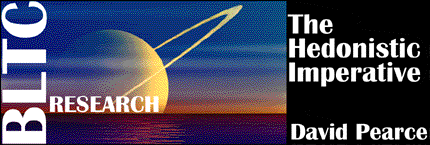A Post-Galilean Philosophy Of Mind?
5.0 There is thus an insidious intellectual danger to any story which encourages conscious mind to believe it is ever directly "presented" with a mind-independent macroscopic world of medium-sized classical objects - such as brains. Even shop-soiled knowledge just isn't that cheap. One's everyday classical world is a psychological adaptation characteristic of DNA-driven human mentality. If the legacy metabolic pathways of a species-specific psychochemistry are mistaken for a vaster self-transcendent world, then it's easy systematically to misconstrue the nature of Everett's Multiverse as a whole - and lose much of one's mind in the process. For the properties of our gappy autobiographical toy-worlds, notably brute classical matter and thin serial consciousness, simply don't add up to an ontologically unitary world picture. Folkish perception allied to folkish brain-lore makes reductive explanation impossible. Not even the fiendish cunning of supervenience relations as conceived by analytic philosophers can reconcile matter and consciousness. It's all gone horribly wrong from the outset.5.1 A go-for-broke program aiming at maximal simplicity, economy and theoretical depth, on the other hand, gambles that a canonically recast maths, physics and phenomenology are coextensive and exhaustive of the world. [See the technical appendix for details]. As expounded here, this conceptual framework entails a naturalised, idealistic monism characteristic of a world completely described by the mathematical formalism of QM. The really hard problem, I think, is why anything exists. Perhaps this is still the best bet for a truly insoluble meta-mystery from which all other puzzles ultimately derive. For the most part, however, we're still ignorant of the 'puzzles' we will have to explain, let alone the theories we'll need to do so ('The End of Science?' For Christ's sake!] For sure, the new state-spaces of consciousness, new semantic primitives, and new universes of discourse to be explored are all in a sense implicit in the equation(s?) of the TOE. They'll just never be accessible to us simply by deeper thought and harder work under the psycho-chemical status quo. The proscription of experiment by the power-elite has ensured that we mostly mistake parochial and unrepresentative slivers of consciousness for the whole phenomenon itself. So right now, I worry that I'm just digitally doodling rather than doing real empirical research.
5.2 Yet what about The Big One? It's hard to see what methodology to use to attack the meta-mystery of why there is anything at all. Its solution may indeed be cognitively closed to us; just as it is for, say, chimpanzees. If we assume so, we'll certainly never get anywhere. So we might as well assume that it isn't. Let's suppose that [informally] an explanation is complete when one shows that what is the case is the only possible way things could actually be. We can apparently express, though not imagine, the possibility of nothing at all having existed. This would have left nothing to explain. So one might attack the Riddle of Existence via a contrastive attempt first to define rigorously and precisely what must be the case for nothing to exist or explain. [No space or time or dimensionality? No meaning or reference or properties or events? No truth or logic? Nothing to quantify over or be the case? No reified absence? Nothing which follows from this absence?]. Intuitively obvious as its meaning may seem, full-blown(!) nihilism proves exceedingly difficult to explicate: it's not clear whether it could potentially have anything even analogous to truth-conditions.
5.3 At any rate, counter-intuitively, it transpires on the basis of some extraordinarily (psycho-?)physical coincidences and an analogy with the rich mathematical properties of zero, that the condition of (infelicitously) nothing whatsoever existing may be formally equivalent to, and thus its description intersubstitutable with, what we currently think is the case - albeit under another description altogether. Does the non-additivity of QM superpositions [minds?] make the whole in one sense less than the sum of its (notional) parts; perhaps a universal superposition somehow analogous to 0? This bizarre idea makes sense, however, only on a further assumption. This is that everything in the world can ultimately be explained in terms of properties derived from the conserved constants; and that the conserved constants themselves ubiquitously cancel out to zero. This still leaves quite a bit of work to do. What about consciousness? How on earth could its flavours 'cancel out'? Well, stretching a New Agey metaphor [too much pixie-dust in the synapses? ed], just as all the colours of the spectrum are contained in, and cancel out colourlessly to, white light [0?], perhaps analogously the values of subjectivity presumptively coded by the equations [universal net result: mass-energy=0; electric charge=0; angular momentum=0] somehow do the same. Whether this zero ontology involves numero-linguistic legerdemain, or hints instead at an indispensable shift in our conceptual scheme wherein an explanation space will ultimately be found, I don't know; though I can sure guess.
5.4 Chalmers himself is bold, but not exactly wild. If I'm
wrong and he's one of the zombies his book discusses, he
mimics an extraordinarily diverse mental life; albeit in
a psychedelically unenriched mode of consciousness.
The Conscious Mind itself contains a wealth of
material I haven't even touched on. Its discussion of
idealistic monism alone justifies the purchase-price. The
text as a whole demands to be rescued from the graveyards
of dead trees and uploaded.
Acknowledgements
Many thanks to David Chalmers for some very insightful comments and discussion
E-mail Dave
dave@bltc.com
HedWeb
BLTC Research
Superhappiness?
The Good Drug Guide
Critique of Brave New World
Quantum computing: the first 500 million years
